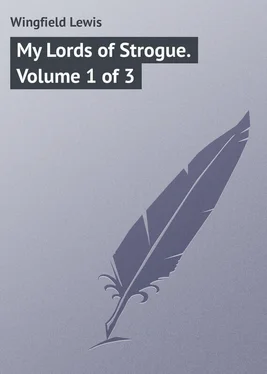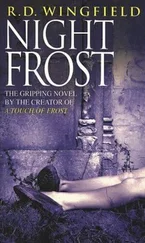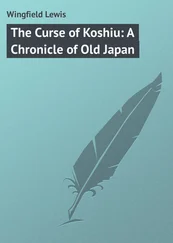Lewis Wingfield - My Lords of Strogue. Volume 1 of 3
Здесь есть возможность читать онлайн «Lewis Wingfield - My Lords of Strogue. Volume 1 of 3» — ознакомительный отрывок электронной книги совершенно бесплатно, а после прочтения отрывка купить полную версию. В некоторых случаях можно слушать аудио, скачать через торрент в формате fb2 и присутствует краткое содержание. Жанр: foreign_language, foreign_prose, на английском языке. Описание произведения, (предисловие) а так же отзывы посетителей доступны на портале библиотеки ЛибКат.
- Название:My Lords of Strogue. Volume 1 of 3
- Автор:
- Жанр:
- Год:неизвестен
- ISBN:нет данных
- Рейтинг книги:3 / 5. Голосов: 1
-
Избранное:Добавить в избранное
- Отзывы:
-
Ваша оценка:
- 60
- 1
- 2
- 3
- 4
- 5
My Lords of Strogue. Volume 1 of 3: краткое содержание, описание и аннотация
Предлагаем к чтению аннотацию, описание, краткое содержание или предисловие (зависит от того, что написал сам автор книги «My Lords of Strogue. Volume 1 of 3»). Если вы не нашли необходимую информацию о книге — напишите в комментариях, мы постараемся отыскать её.
My Lords of Strogue. Volume 1 of 3 — читать онлайн ознакомительный отрывок
Ниже представлен текст книги, разбитый по страницам. Система сохранения места последней прочитанной страницы, позволяет с удобством читать онлайн бесплатно книгу «My Lords of Strogue. Volume 1 of 3», без необходимости каждый раз заново искать на чём Вы остановились. Поставьте закладку, и сможете в любой момент перейти на страницу, на которой закончили чтение.
Интервал:
Закладка:
In due course followed Charles I., who, with the ingrained perfidy of all the Stuarts, fleeced his Irish subjects, and then cheated them by evading the graces for which they paid their gold. His creature Strafford went too far, and they turned as worms will. There was a grand Protestant massacre in Ulster, an appalling picture of a vengeance such as a brutalised people will wreak on its oppressor; and Cromwell took advantage of this as an excuse for still further grinding down the Catholics. It was a fine opportunity to avenge the sufferings of Protestants in other lands-the affair of Nantes, Bartholomew, and so forth. He made a finished job of it, as he did of most things to which he set his shoulder. It was no felony now to slay an Irishman, whose very name was a reproach. He was well-nigh swept from off the earth. Famine and pestilence reigned together alone. Wolves roamed at will in the dismantled towns. Newly-appointed colonists refused to build the walls of shattered cities, for the stench of the rotting bodies poisoned the breeze.
It remained for Orange William and good Queen Anne (neither of whom could be expected to feel interest in Ireland) to add a finishing touch, and the Penal Code was a chef d'œuvre . Under its sweet influence no Catholic could dwell in Ireland save under such conditions as no man who stood erect might bear, and so there commenced an exodus of independent spirits, who flocked into the service of France and Germany, and filled the navies of Holland and of Spain. Thus did British rulers educate their dependency to loving obedience, by teaching its children to revile the name of law. Verily it is no wonder that they loathed the English; that they distrusted British amenities, and looked askance at the half-English upper class.
When the Volunteers determined to regenerate their motherland, there were two great evils with which they had to cope. Two deep plague-spots. It remained to be seen whether they were wise enough and steadfast enough to eradicate the virus. A rotten legislature, an impossible Penal Code. Could Sir Galahad reform so base a parliament? Would the champion dare to free the serfs from thraldom? The first was a Herculean labour, because both Lords and Commons drew much of their revenue from British ministers; the second was even a more Titanic task. Possession is nine points of the law, and the soil was in possession of the small knot of Protestants, who knew that their existence depended on keeping the majority in chains. Like the emigrants of the Mayflower , they said: 'Resolved, that the earth is the Lord's, and the fulness thereof; that the Lord hath given the earth as an heritage unto His saints; and that we are His saints. Ergo : the earth is ours, to have and to hold by pillage and persecution, and murder, if need be, just as the chosen people of old seized and held Canaan, the land of promise, flowing with milk and honey.'
Truly the parliament was a plague-spot fit to gangrene a whole body; for it in nowise represented the nation, consisting as it did of three hundred members, seventy-two only of whom were elected by the people. The rest were nominees of large Protestant proprietors who returned members for every squalid hamlet on their estates, and kept their voters in the condition of tame dogs through a constant terror of ejectment. Of three million Catholics not one had a voice in the elections; for by law they existed not at all. Like Milton's devils they occupied no space, while the Protestant angels filled the air with their proportions.
It was said of the Irish gentry of the last century that they possessed the materials of distinguished men with the propensities of obscure ones, which is a picturesque way of admitting that they were incorrigibly idle. To indolence add poverty and a propensity for drink, and you have a promising hotbed for the growth of every ill. The aristocratic pensioners were, as a rule, lapped in excessive luxury, which could not be kept up without extraneous help; half English by education as well as origin, they naturally leaned for protection towards the English Government.
The gentry, ignorant and sensual, were given to profuse hospitality, regardless of mortgaged acres and embarrassed lands. Dog-boys and horse-boys hung about their gates; keepers and retainers lolled upon their doorsteps, together with a posse of half-mounted poor relations-all of them too genteel to do anything useful-fishing for the speckled trout by day, drinking huge beakers of claret and quarrelling among themselves by night, till in many cases there was little left, after a few years, for the filling of a hundred mouths beyond a nominal rent-roll and the hereditary curse of idleness. Not a squire but was more or less floundering in debt, and (his sense of honour blunted by necessity) only too anxious for a little cash at any price. Government agents were always conveniently turning up ready and willing to purchase mortgages and notes of hand, which were duly stored in the coffers of the Castle as a means of prospective coercion by-and-by.
With such materials for a national 'Lords and Commons,' it is little wonder if a sudden revulsion in favour of patriotism on the part of a body of enthusiasts should threaten to set the country agog. How was the parliament to be purified? That was the rub. Was it to be exhorted to virtue gently, or flogged into improvement? The leaders of the Volunteers had carried their first point with a rush. The parliament was with them, or feigned to be so. But what if the existence of the Parliament should come to be threatened? The sincerity of its professions would be put to a crucial test. Careless lords and impecunious squires babbled of freedom and cackled of free trade, because it was become the fashion and pleased the Volunteers. What cared they for free trade? That was a question which affected the men of Ulster, to whom commerce was as lifeblood, and who indeed were the prime workers in this movement. The dissenting traders of Belfast had demanded a free trade, and British ministers had given way. Therefore Lords and Commons joined in the popular cry, and pretended that it interested them. The position was a paradox. Here was all at once a military supremacy independent of the crown, and ministers in London were compelled to countenance it. It was humiliating; but their comfort lay in this. Would the Volunteer leaders allow zeal to overstep prudence? Probably they would. They might be coaxed by crafty submission to do so. If a collision could only be brought about between a self-elected military despotism and an effete but constitutional senate, there were the materials for such a pretty quarrel as might produce a repetition of the fate of the Kilkenny cats. One would devour the other, and England would gloat over the tails. The British premier made a parade of 'doing something for Ireland' to oblige the Volunteers.
With a flourish of alarums he repealed some obnoxious laws, which graceful conduct was received in Dublin with gratitude, till somebody pointed out that Albion was at her tricks again: whilst seeming gracefully to give way, she was really strengthening her own position by establishing a new precedent on the basis of the Poynings statute, to the effect that such favours were in the gift of England's Parliament-not Ireland's-and might accordingly be withdrawn at any time. The Volunteers were furious, Albion was perfidious; the Irish senate was playing a double game, there was no use in mincing matters in the way of compromise. England must distinctly abdicate all parliamentary dominion; parliament must be remodelled on new lines. In the future the senate must be upright, zealous, independent, incorruptible; English gold must be as dross; an English coronet hold no allurement.
As might be expected, the new cry created a commotion. Patriots there were both in Lords and Commons, who were prepared to sacrifice part of their income for the general good, but they were few. If pensions were withdrawn and mortgages foreclosed and proprietors in prison, what mattered to these last a national liberty? The notion was an insult, and parliament stood at bay. But the ardour of the Volunteers would brook no dallying. Ulster, as usual, took the lead. Sharpwitted, frugal, Scotch, the battalions of the North convened a general assembly. On Feb. 15, 1782, one of the most impressive scenes which Ireland ever witnessed took place at Duncannon, where two hundred delegated volunteers marched two and two, calm, steadfast, virtuous, determined to pledge themselves before the altar of that sacred place to measures which might save their motherland or kill her. After earnest thought, a manifesto was framed-a dignified declaration of rights and grievances, a solemn statement of the people's will, a protest against English craft and Irish corruption-inviting the armed bodies of other provinces to aid in the process of regeneration.
Читать дальшеИнтервал:
Закладка:
Похожие книги на «My Lords of Strogue. Volume 1 of 3»
Представляем Вашему вниманию похожие книги на «My Lords of Strogue. Volume 1 of 3» списком для выбора. Мы отобрали схожую по названию и смыслу литературу в надежде предоставить читателям больше вариантов отыскать новые, интересные, ещё непрочитанные произведения.
Обсуждение, отзывы о книге «My Lords of Strogue. Volume 1 of 3» и просто собственные мнения читателей. Оставьте ваши комментарии, напишите, что Вы думаете о произведении, его смысле или главных героях. Укажите что конкретно понравилось, а что нет, и почему Вы так считаете.












